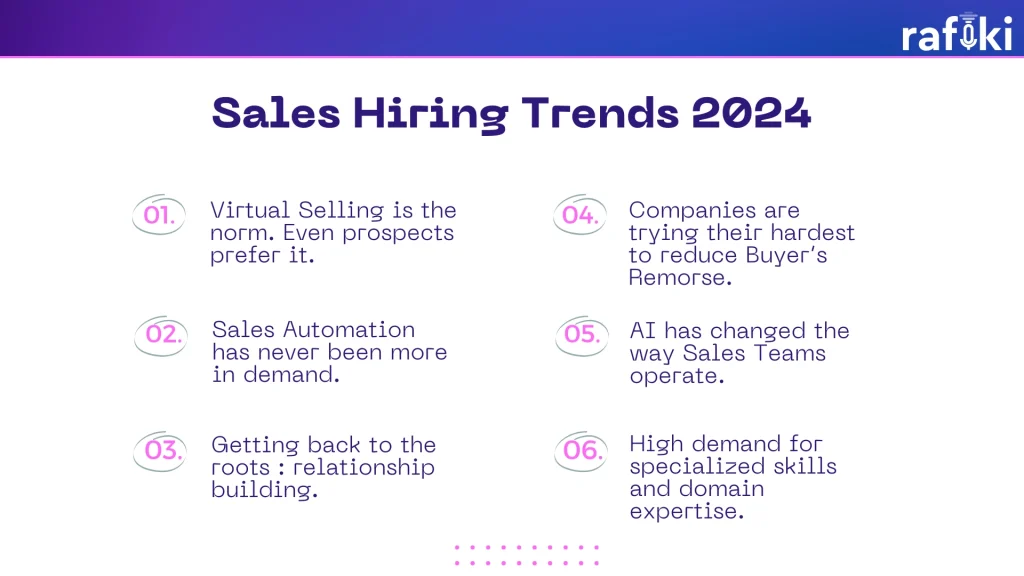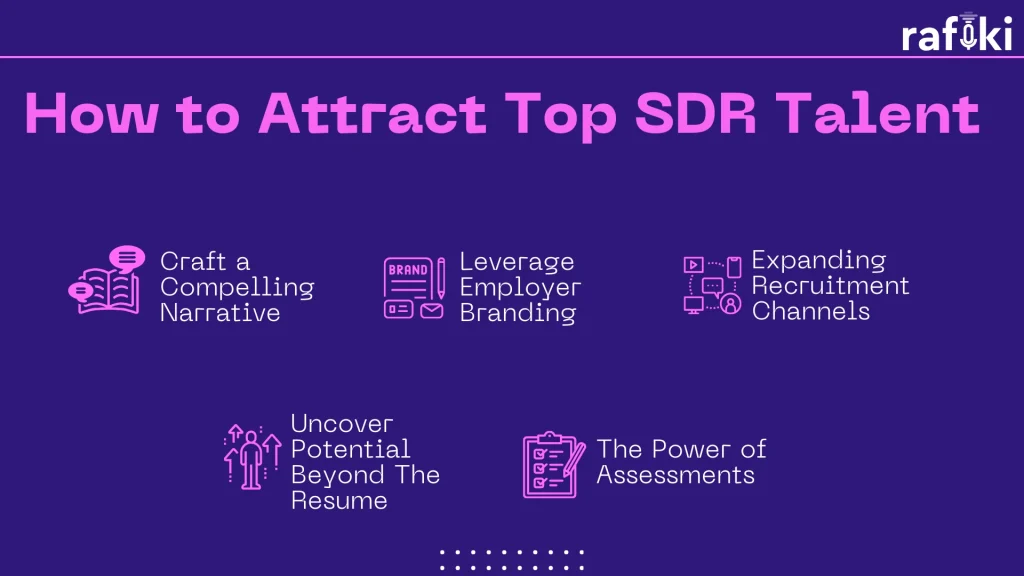Why Rafiki
Pricing


Pricing
Solutions

RevOps Leaders
Synchronize revenue generating functions

SDR Leaders
Get your team aligned and Coach your Reps 3x faster at scale

Sales Leaders
Unlock pipeline truth, drive confident forecasts

Let's face it, hiring great SDRs can feel like searching for a unicorn. You know they're out there, these prospecting powerhouses who can fill your pipeline with qualified leads. But between the competition for top talent and the challenge of finding the right fit, building a stellar SDR team can be a real headache. The traditional route of experience-heavy candidates can be limiting, and frankly, expensive.
So, what's a sales leader to do? Here's the good news: hiring SDRs with the hidden potential to become sales superstars is absolutely possible.
Imagine a high-performing sales team as a finely tuned engine. The marketing team ignites the spark, attracting potential customers. But it's the SDRs, or Sales Development Representatives, who act as the fuel injectors, keeping the pipeline brimming with qualified leads and propelling the engine forward.
An SDR's day-to-day revolves around prospecting, that is, identifying and reaching out to potential customers who might benefit from your product or service. They're the initial point of contact, sparking interest through compelling conversations and presentations. But their role goes beyond introductions. SDRs are the gatekeepers of the sales funnel, meticulously qualifying leads by uncovering their needs, budget, and decision-making authority. This involves active listening, insightful questioning, and the ability to navigate objections effectively.
However, SDR life isn't without its challenges. Facing a barrage of rejections and overcoming cold call anxiety are par for the course. Success hinges on resilience, a positive attitude, and the ability to learn from setbacks. Victory for an SDR isn't just about hitting daily quotas. It's about exceeding expectations, consistently exceeding their call targets, and qualifying a high volume of leads that convert into sales opportunities. They're the silent heroes behind closed deals, ensuring the closers have a steady stream of qualified prospects ready to move through the sales pipeline.
So, in essence, a strong SDR team is the foundation for a predictable and high-performing sales engine.
Before we talk about the qualities you should look for in SDR candidates, it’s important to understand the latest trends in sales hiring. This will help you understand why the below discussed are the qualities you should target.

We’ve already discussed the case of hiring experienced SDRs with great achievements, but that’s perhaps reserved for the bigger companies with deep pockets. So, the question is how do you succeed in the absence of those vast resources? Look for these qualities:
Keep in mind, a well-rounded SDR doesn't need to be a seasoned sales veteran. Identify talented individuals who possess the raw potential to become cornerstone members of your sales team.

In the ever-competitive world of sales, attracting top SDR talent can feel like competing in the Hunger Games. Moreover, experienced reps are snatched up quickly, and entry-level candidates often lack the specific industry knowledge. So, how do you break free from this hiring rut and build a high-performing SDR team, even with limited experience in the mix? So, here's where strategic thinking and a shift in perspective come into play.
Let's face it, job descriptions for SDR roles can be a dime a dozen. To truly stand out, ditch the generic language and craft a narrative that ignites excitement. Highlight the growth opportunities you offer. SDRs aren't just making calls; they're the foundation of your sales success story. Showcase the career path you provide, the chance to develop valuable skills, and the potential to become a top-performing closer in the future. Hiring superb SDRs can only be achieved when they know there's a great future for them with you.
These days, your company culture is always on display for the world to see. Use social media platforms like LinkedIn to showcase your SDR team's success stories. Feature testimonials about the positive work environment, the supportive culture, and the opportunities for professional development. Remember, happy SDRs make for compelling employer branding content.
Think outside the traditional job boards. Partner with universities and colleges with strong business programs to tap into fresh talent. Additionally, consider employee referral programs – your current SDRs might know hidden gems within their networks. Get involved in online sales communities and forums where aspiring reps congregate. By diversifying your recruitment channels, you cast a wider net and increase your chances of finding those diamonds in the rough.
Resumes can be deceiving. Don't get hung up on years of experience in a similar role. Focus on transferable skills. Look for candidates who excelled in customer service or demonstrated success in exceeding targets in other industries. Behavioral interviewing techniques can be highly effective here. Present realistic sales scenarios and assess how candidates approach objections, handle pressure, and uncover customer needs. This is key to hiring top SDRs.
Pre-employment assessments can be a valuable tool in your talent acquisition toolbox. Skills assessments can help you identify candidates with strong communication, problem-solving, and time management abilities. Personality assessments can shed light on a candidate's coachability, resilience, and overall drive. Assessments are just one piece of the puzzle; use them alongside interviews and other selection methods for a well-rounded picture.
You've cast a wider net and attracted a pool of promising candidates. Now comes the crucial stage: identifying the hidden gems who possess the potential to become your future sales superstars. While a stellar resume can be a good starting point, it's not the sole indicator of success. Here's how to delve deeper and unearth the true talent during the interview process:
Move beyond the generic "tell me about a time you..." questions. Embrace behavioral interviewing techniques that focus on past actions and behaviors to predict future performance.
Additionally, present realistic sales scenarios that mimic the day-to-day challenges SDRs face. Ask candidates to describe how they'd navigate a cold call with a hesitant prospect, handle a complex objection, or qualify a lead with limited information. Their responses will reveal their communication skills, problem-solving abilities, and approach to building rapport.
Top SDRs are lifelong learners who possess a natural aptitude for sales. Look for candidates who demonstrate a genuine curiosity about your product or service. Ask them insightful questions about your target market, your value proposition, and how they see themselves contributing to the sales team's success.
Rafiki's Smart Call Scoring can be a valuable tool here. If you have recordings of past successful SDR calls, analyze them to identify communication patterns and key selling behaviors. During the interview, use these insights to craft questions that assess a candidate's potential to replicate those successful behaviors.
The interview is just one piece of the puzzle. Consider incorporating a short sales simulation or role-playing exercise. This allows candidates to showcase their communication skills and approach to prospecting in a practical setting.
Additionally, providing a take-home assignment relevant to the SDR role and your context can offer valuable insights into their research abilities, problem-solving approach, and overall work ethic. If you do ask for completion of an assignment, make sure the candidate is fairly compensated. No one wants/should have to work for free, even for an interview.
Building a high-performing SDR team isn't about finding unicorns with years of experience. It's about identifying raw talent, coachable individuals with the hunger to learn and the potential to excel. By focusing on the qualities that truly matter and implementing these strategic hiring practices, you can unlock a hidden pool of talent ready to become the fuel injectors of your sales engine.
Guide your SDRs to be their best
So, unleash your inner talent scout, and get ready for hiring top SDRs to build the dream team that will drive sales success.